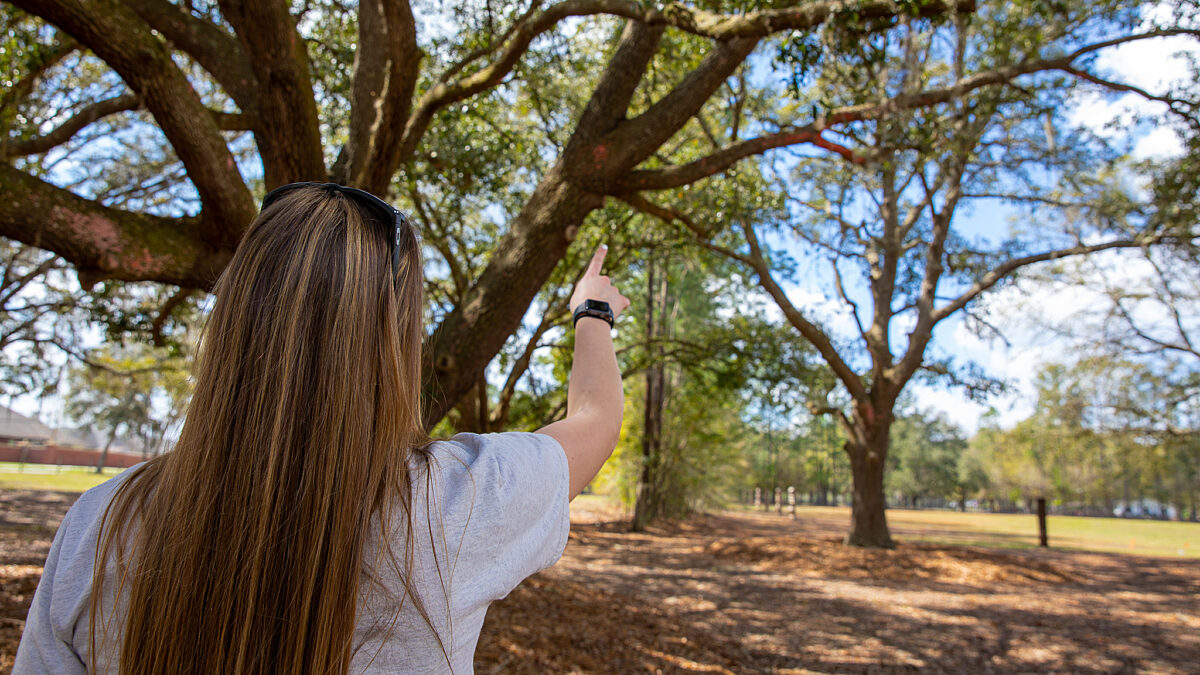Growing A Lasting Food Source - Deseret In The Florida Panhandle
TOPICS
ConservationErin Anthony
Director, Communications

photo credit: AFBF Photo, Morgan Walker
Erin Anthony
Director, Communications

By G.B. Crawford
Most Florida farm producers are very good at conserving natural resources as they grow food. They know their livelihoods depend upon the land and water they manage.
Michael Archibald and his employees at Deseret Cattle & Timber have a mission to preserve a substantial agricultural property for the indefinite future. They produce cattle and timber on more than 300,000 acres in various parcels located west of the Apalachicola River.
Archibald, general manager of the operation, said environmental stewardship is fundamental to the sustainability of the operation. “We cooperate closely with state agencies and local agencies in adopting best management practices for water quality and water habitat,” he noted.
“The best use and purpose for the land not only benefits cattle, it also benefits plant diversity and wildlife. Ultimately, it benefits the land by making it more productive. We have always tried to make our lands produce in better ways – not only for us, but for the next generation.”
Visitors encounter spectacular panoramas of wildlife as they gaze on the company’s various pastures. A commitment to natural resource conservation as well as food production is also apparent in the employee roster. Two biologists and an agronomist are on the payroll, in addition to the cattlemen and foresters.
The Panhandle enterprise, based in Gulf County, often partners with researchers at the University of Florida’s Institute of Food and Agricultural Sciences (UF/IFAS) to offer sites for a variety of field tests.

Recent projects have included studies of limpograss (a forage grass) and bear habitat. In another trial, company employees found that they can roll a heavy chopper over tree stumps and leave them to enrich the soil when clearing land for pastures. By doing so, they avoid digging out stumps and burning them.
Ann Blount, a researcher at the UF/IFAS North Florida Research and Education Center in Quincy, has worked with Deseret staff members in both Central Florida and the Panhandle for four decades. In that time she has closely observed their conservation accomplishments.
“They really are very conscientious land stewards,” Blount said. “They have an extremely well-trained staff that has done a commendable job of working with us at the North Florida Research and Education Center. They are doing what you are supposed to do with best management practices.”
The North Florida properties were previously maintained by the St. Joe Company exclusively to produce timber. Ag Reserves, an investment affiliate of the Church of Jesus Christ of Latter-day Saints, purchased the land in 2014, establishing Deseret Cattle & Timber there with the intention of developing a combined beef cattle and forestry operation.
Archibald pointed out that the acreage is a permanent addition to Ag Reserves holdings. “The purpose of the purchase was to expand the ag land portfolio,” he said. “We are always looking for land. This was an opportunity to expand ranching operations and do so to meet our internal rate of return.”
Local business leaders have lauded Deseret’s employment of more than 50 people as well as its long-term commitment to the area. Jim McKnight, director of the Gulf County Economic Development Coalition, said Deseret Cattle & Timber has been a “blessing” for the region.
“We are proud to have them as neighbors and community partners,” McKnight said. “They provide good-paying jobs with benefits and opportunities to grow with the company. They are good corporate citizens who routinely provide support for the schools, athletic programs and other community projects.”
One notable example of community support was apparent after Hurricane Michael struck the Panhandle in 2018. Deseret employees assembled for work after the storm passed, but then took vehicles, equipment and supplies out into the surrounding countryside so they could assist residents with emergency repairs, road clearing and other, related tasks.
As a livestock operation, the company follows a comprehensive policy of animal care. Under the provisions of this policy each animal must be provided with appropriate feed, water and living conditions and routine health inspections.
“One of the key platforms of our sustainability programs is animal handling and welfare,” Archibald said. “We put a lot of focus on that. From our rotational grazing program to the way the cattle are handled in the pens, it all goes back to handling and lowering the stress on the animals.
“It’s not something our employees just do. They do it because it is a way of life for them.”
Good livestock care also helps support the business. According to UF/IFAS researchers, the adoption of such practices improves the competitive position of cattle ranchers. For Deseret, regular production for both domestic and international markets is vital for its financial stability.
Staff members have already put together a management plan for enhancing the operation over the next 30 years. Pride in the commodities they sell reinforces their commitment to a permanent presence in the region.
“It’s exciting to produce a product you are proud of,” Archibald noted. “In the United States we produce high-quality, consistent products that are valued throughout the world.
“I think it is pretty neat that we can be involved in growing something that people on the other side of the world are enjoying at their dinner tables.”
G.B. Crawford is director of public relations for the Florida Farm Bureau.